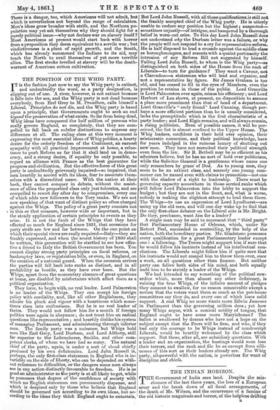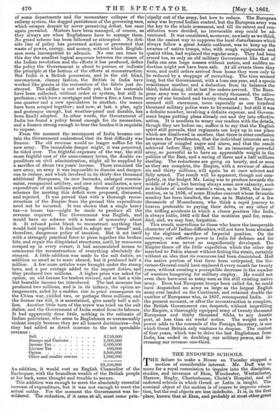THE INDIAN HORIZON.
THE Government of India sees land, Despite the mis- chances of the last three years, the loss of a European army and the break down of all fiscal arrangements, of the death of Mr. Wilson, and the occurrence of a famine of the old historic magnitude and horror, of the helpless drifting of some departments and the momentary collapse of the railway system, the dogged persistence of the governing race, which escapes despair by never perceiving defeat, has once again prevailed. Matters have been managed, of course, as they always are when Englishmen have to manage them. No grand scheme has been followed or attempted. No defi- nite line of policy has governed action or prevented that waste of power, energy, and money, without which English- men seem incompetent to advance. No one can trace to this day the smallest logical sequence between the causes of the Indian revolution and the effects it has produced, define the policy the Government is about to pursue, or indicate the principle at the bottom of the efforts at reconstruction. But India is a British possession, and in the old blind, unconscious, clumsy fashion, the British in India have worked like giants at the restoration of the fabric just de- stroyed. The edifice is not rebuilt yet, but the materials have been collected, without order or system, but still in profusion ; with here a mortgage and there a fine, a loan from one quarter and a new speculation in another, the means have been scraped together ; and now, at last, a plan, ugly and grotesque enough, but weather-proof and durable, has been finally adopted. In other words, the Government of India has found a policy broad enough for its necessities, and a finance strong enough to bear the burden it is requisite to impose. From the moment the reconquest of India became cer- tain the Government understood that its first difficulty was finance. The old revenue would no longer suffice for the new army. The immediate danger might, it was perceived, be tided over. The frightful expenses of the war, ' the still more frighful cost of the unnecessary levies, the double ex- penditure on civil administration, might all be supplied by a sacrifice of about two years' income. There remained the new army, an army it was impossible to dismiss and danger- ous to reduce, and which involved in its thirty-five thousand additional Europeans, its new barracks, enlarged commis- sariat, reorganized artillery, and new civil auxiliaries, a new expenditure of six millions sterling. Scores of symmetrical schemes for meeting this deficit were proposed, discussed, and rejected. It was proved that with a thorough recon- struction of the Empire from the ground this expenditure need not be incurred. It was shown that a single heavy tax—a house tax—might be made to produce all the revenue required. The Government was English, and would have no scheme with a trace of symmetry about it. It refused point blank to reconstruct anything that would hold together. It declined to adopt any "broad" and, therefore, dangerous policy of taxation. But it set itself with a strangely practical force to piece together the broken bits, and repair the dilapidated structures, until, by resources scraped up in every corner, it had accumulated means to commence the reconstruction of everything absolutely de- stroyed. A little addition was made to the salt duties, an addition so small as to seem absurd, but it produced half a million. A few more articles were brought under the stamp laws, and a per centage added to the import duties, and they produced two millions. A higher price was asked for opium, an old license for traders revived, and at last a wide but bearable income tax introduced. The last measure has produced two millions, and is in its infancy, the opium ar- rangements, aided by a sudden rise in price consequent on the China war, yielded two, or perhaps three millions, and the license tax will, it is ascertained, give nearly half a mil- lion. Another little turn of the screw was tried on the salt duties, and the Government of India rested from its labours. It had apparently done little, nothing in the estimate of Indian politicians, who seem to Englishmen so unreasonably violent simply because they are all honest doctrinaires—but they had added as direct increase to the net spendable revenue : , Salt £750,000 Stamps and Customs 2,000,000 Income Tax 2,000,000 License Tax . . . . . 500,000 Opium 2,000,000 Other and smaller sources . . 1,000,000 28,250,000 An addition, it would cost an English Chancellor of the Exchequer, with the boundless wealth of the British people at his back, some thought and trouble to secure. • This addition was enough to meet the absolutely essential increase of expenditure, but it was not enough to meet the actual outlay. For the moment the Government was be- wildered. The reduction, if it came at all, must come prin- cipally out of the army, but how to reduce. The European army was beyond Indian control, but the European army was the key to the whole armament, and till its extent and con- stitution were decided, no irrevocable step could be ad- ventured. It was considered, moreover, unwisely as we think, that the easiest way to suppress the local disturbances which always follow a great Asiatic outburst, was to keep up the swarms of native troops, who, with rough equipments and quaint titles, had replaced the regular army. They had been armed too, as only an old military Government like that of India can arm huge masses without notice, and sudden re- duction might not have been safe. At all events there they were, and until orders arrived from home they were only to be reduced by a stoppage of recruiting. The time seemed long, but the Government, with a loan one year, and a specie remittance another, and a deduction from its balances the third, tided along, till at last the orders arrived. The Euro- pean army was to consist of seventy thousand, the native army of one hundred and twenty thousand men. The force seemed still enormous, more especially as one hundred thousand military police were to be retained ; but still it was a definite number, involving a definite expense, and Govern- ment began putting plans already cut and dry into effective action. It is needless to weary our readers with the details, though they are before us ; suffice it to say that the English spirit still prevails, that regiments are kept up in one place which are disallowed in another, that there is utter confusion between the Presidencies, that the individual interests are in an uproar of mingled anger and alarm, and that the result achieved before May, 1862, will be an immensely powerful army, so powerful as to have an appreciable weight in the politics of the East, and a saving of three and a half millions sterling. The reductions are going on hourly, and as soon as they are complete, the Empire, with a revenue of about six and thirty millions, will again be at once solvent and fully armed. The result will be apparent, though not com- pletely, in the budget Mr. Laing was to produce towards the middle of April, but barring always some new calamity, such as a failure of another season's rains, as in 1861, the insur- rection, as in 1856, of some Hindoo convent whose favourite monkey has been insulted, the rise, as in Malabar, of a few thousands of Mussulmans, who think a rapid journey to heaven preferable to paying their debts, or any other of the trifling accidents to which a cloaca gentians like India, is always liable, 1862 will find the mutinies paid for, reme- died, and, we may fear, forgotten.
This result, marvellous to those who know the insuperable character of all Indian difficulties, will not have been attained by the slightest sacrifice of Imperial position. On the contrary, our effective power in India for defence and for aggression was never so magnificently developed. The Empire threw off the little expedition which the other day marched to Pekin almost without feeling the strain, certainly without an idea that its resources had been diminished. Had the native portion of that force been extirpated, the Go- vernor-General could have replaced it every month for twenty years, without creating a perceptible decrease in the number of warriors hungering for military employ. He would not even then have sent so many men as the still existing native army. Even had European troops been called for, he could have despatched an army as large as the largest English army ever landed on the Continent, and retained double the number of Europeans who, in 1857, reconquered India. At the present moment, or after the reconstruction is complete, the British Government can despatch, without imperilling the Empire, a thoroughly equipped army of twenty thousand Europeans and thirty thousand Sikhs, to any Asiatic port, at less than six weeks' notice. The weight such a power adds to the counsels of the Foreign Secretary, is one which Great Britain only ventures to despise. The contest of four years, which was to drive the last Englishman from India, has ended in doubling, our military power, and in- creasing our revenue one-third.































 Previous page
Previous page